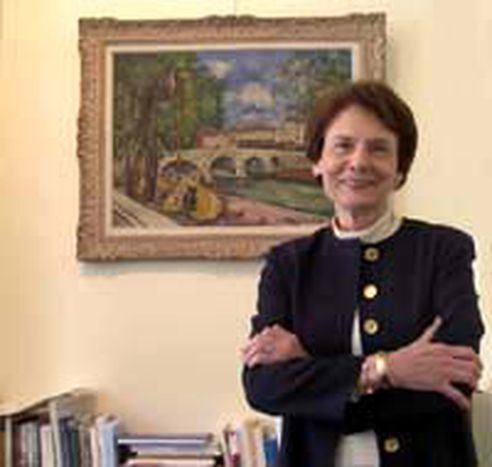
"Young people need Europe to be maternal"
Published on
Translation by:
 catherine wilson
catherine wilson
We took a trip with Catherine Lalumière, former MEP and now president of the House of Europe in Paris, into the construction of the European Community
At 71 years of age, Catherine Lalumière is still a strong woman in Europe. After holding various offices in French politics, she went on to become secretary general of the Council of Europe from 1989 to 1994 and then served as vice president of the European Parliament.
Europe Day has been celebrated on 9 May every year since 1985. What is the significance of this date?
It commemorates the declaration made on 9 May 1950 by Robert Schuman, the French Foreign Minister at the time, which formed the basis for establishing the European Coal and Steel Community (ECSC). It was the start of the process of European integration.
That’s not to say that lots of things didn’t happen before 1950. The founding fathers of Europe, after the war had left its mark on them, wanted to achieve something lasting – namely, peace. In order to do so, they needed to restore democracy to a continent scarred by Nazism and Fascism. That is why the Council of Europe, the first ever European institution, was established in 1949. After that, it was the ECSC that went on to build an economic Europe based on a common value of humanism we find in all the great European institutions. Humanism forms the foundations of all European construction. It’s at the centre of the whole European philosophy.
On the 9 May 1950, you must have been 15. What were the initial steps in building the European Union like for you?
In 1950, I was living in a typically provincial French family, whose view of the world didn’t reach past our own borders. I must be honest – at that time, right up until I finished school, Europe just wasn’t part of my world. It wasn’t until much later that I got to know how the community worked and started to feel European. The big event back then was the death of Stalin in 1953. I remember it well; the local paper even ran a special edition. I couldn’t imagine the world without Stalin! And yet I was completely oblivious to the idea of building a European Union.
How has the sense of belonging to Europe changed over the last 56 years?
I would say that, in 2006, lots of young people are as ignorant and indifferent towards the European project as I was back then. It’s baffling! By now, all of them - be they Italian, German, French, whatever - should know about Europe, understand the ideals behind the EU and support its values. Being European is part of lots of young people’s daily lives, but they don’t stop to think about it. They learn foreign languages and travel on the Erasmus scheme, but I get the impression that they don’t actually question the meaning behind the European project. They take Europe for granted. That’s all there is to it, which is a real shame!
Between 1950 and 2006, has Europe changed from being full of hope to full of fear?
Nowadays young people are scared, but the reasons for their fears do not just come from Europe. Young people are scared of borders opening up and of globalisation. Another of their fears is caused by our country’s weakness. In places like France, the state plays a very important role in protecting society and its freedoms. By putting the emphasis purely on the common market, politicians are making it seem as if Europe is only about economics. Rampant materialism means the focus is on money and on the issues surrounding the European currency. These things are very important but they don’t offer any hope. That’s why today Europe’s image is so cold. If there is no human, spiritual dimension to European projects – ideas, values, a design for society – they will always be cold, dry and unappealing, whatever the proposals! I believe that is where the sense of frustration and the fears associated with Europe come from. Young people need Europe to be reassuring, maternal even. Nowadays, that protective side has been abandoned.
Europe Day is also about celebrating memories. Can you tell us about a memorable event in your ‘life in Europe’?
The biggest moment for me was when Spain acceded [Catherine Lalumière was secretary of state for European Affairs during Spain and Portgual's entry to the European Community]. In December 1985, in the Council of Ministers’ room in Brussels, the negotiations were finished in the middle of the night, after an unbelievable marathon session. We called in the Spanish delegation there and then, headed by Spain’s then Minister of Foreign Affairs, Fernando Morán. He walked over, held out his arms and cried, “Thank you France. I will never forget what you have done for my country!” I will always remember that.
Translated from « Les jeunes ont besoin d’une Europe presque maternelle »


